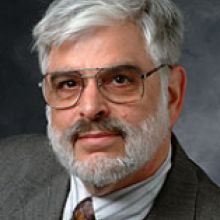Jeffrey Ullman of Stanford University is a renowned American computer scientist who just won the 2020 Association for Computing Machinery A.M. Turing Award -- and he has two generations of Stony Brook connections.
The Turing award, which is more commonly referred to as the “Nobel Prize for Computing,” is the most prestigious distinction in computer science. Recipients are honored for their profound and lasting contributions to the field of computer science. Jeffrey Ullman and Alfred Aho shared the 2020 Turing award for their work in programming and algorithms, and their publications of these findings into highly-esteemed books which continue to educate computer scientists. 
Two Stony Brook Computer Science faculty members have worked closely together with Ullman. Professor Emeritus Arthur Bernstein acted as Ullman’s thesis advisor at Princeton University, up until Ullman’s graduation in 1966. The other is Himanshu Gupta, who was Ullman’s PhD student at Stanford University before graduating in 1999.
Ullman, now the Stanford W. Ascherman Professor of Engineering, Emeritus, at Stanford University, started his work in the beginnings of computer science research. Over decades of work, Ullman has made profound contributions to a variety of domains within computer science: algorithm design and analysis, programming language theory and implementation, and programming language compilers.
Above all of this, Ullman is most broadly-known for his published literature in these fields. “What stands out is his contributions to compilers and many of his widely followed textbooks,” says Himanshu Gupta.
Some of Ullman’s most highly-esteemed textbooks: Principles of Compiler Design (1977), Introduction to Automata Theory, Languages, and Computation (1979), and The Design and Analysis of Computer Algorithms (1974), among others, are celebrated and are used by students and researchers alike.
While Ullman gained extensive attention through his textbooks and the ACM A.M. Turing Award, Ullman has been grasping the attention of students throughout his decades-long work as a professor. Himanshu Gupta, as Ullman’s PhD student, benefitted from his brilliance and experience.
“One of the most honorable things about Jeff was his willingness to go out of his way to support his students in any way possible,” says Gupta. “As a mentor, his best quality was the freedom he gave us, and his encouragement to aim high in our research.” The encouragement to tackle difficult, research-driven problems, afforded to Gupta by Ullman, was very influential towards his future endeavors.
This mentor-mentee relationship ultimately “made me a better faculty member here at Stony Brook,” says Gupta.
Before shaping the lives of students, Ullman was shaped by Stony Brook’s very own, Professor Arthur Bernstein at Princeton University. Bernstein was one of the founding figures of the Stony Brook Department of Computer Science, famous for identifying "Bernstein's conditions" that ensure correct computations in parallel processing.
“I never realized Ullman was Art's graduate student until he won the ACM A.M. Turing Award, but the computer science world was a lot smaller fifty years ago. At that time, Stony Brook was one of the earliest computer science departments in the country, and our founding faculty were all real pioneers in their field. Beyond his accomplishments in computing, Art is a nice guy and a great sculptor,” says AI Institute Director Steven Skiena.
Because of Stony Brook University's pioneering influence in computer science, it is no surprise that university faculty has crossed paths with a founding and eminent member of the field, Jeffrey Ullman. Indeed, Ullman visited the department back in 1989 as a distinguished lecturer.

